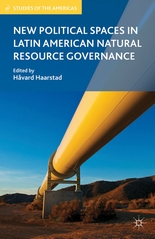
This book examines how natural resources are governed and struggled over in Latin America. It questions the idea the ‘post-neoliberal’ governance label and illustrates the enduring constraints on democratic and ‘just’ resource extraction. Case studies written by anthropologists, geographers, and sociologists show how resource dependencies continue to shape the political space.
Natural resources have traditionally been considered a curse on Latin American societies, from the plundering of the colonial era to the ills of commodity dependency in later years. But recently, there has been widespread optimism of a “post-neoliberal” era in which different types of alternative models are constructed, more in favor of what the local people affected by the mining want. This seems the case in Andean societies in particular, where indigenous and “new” social movements have over the past two decades successfully mobilized and campaigned for substantive rights, territory, and inclusion, as well as a greater share of extraction revenues. But this books shows that all is not well in the mining sector in Latin America, far from. That must have been obvious already for anyone who follows EJOLT or has already read our report on mining conflicts around the world.
According to editor Håvard Haarstad, a Postdoctoral Research Fellow at the Department of Geography (University of Bergen, Norway), ‘the “resource curse” and a return to populist authoritarianism are lurking in the shadows. Put simply, there are real grounds for optimism that natural resource extraction can improve livelihoods in the region, but at the same time there are many pitfalls and lingering problems that can undermine a just distribution of risks and benefits.’ This book, like EJOLT does in the last two years now, illustrates some of these struggles.
One chapter was co-written by EJOLT collaborator Lucie Greyl: Non-extractive Policies as a Path to Environmental Justice? The Case of the Yasuní Park in Ecuador. It makes a reflection on the innovative proposal to leave the oil in the Yasunì Park in Ecuador underground. EJOLT has already written about this proposal and will soon release a full report on it. The Yasunì Park, a UNESCO World biosphere reserve in the Ecuadorian Amazonia, is a hotspot of bio- and ethno-diversity whose reproduction capacities have been increasingly jeopardized in recent decades, particularly because of the oil extraction activities. The Yasunì-ITT initiative proposes to leave over 846 million barrels of oil in the ground, not only to protect forest biodiversity, but also in order to foster innovative strategies of energy production and consumption, to face climate change and to advance an alternative model to the carbon emissions market. Lucie’s chapter provides a theoretical discussion of the challenges of this proposal and the difficulties faced in the process of nationalisation of oil companies from a socio-environmental point of view. It highlights the role of civil society in the development and implementation of the initiative by exploring the philosophical and political ideas in which the arguments of the involved actors are grounded. Finally, it uses the Yasuní case to reflect more broadly on extraction, non-extraction policies, and social justice.

The project ENVJUSTICE has received funding from the European Research Council (ERC) under the European Union’s Horizon 2020 research and innovation programme (grant agreement No. 695446)